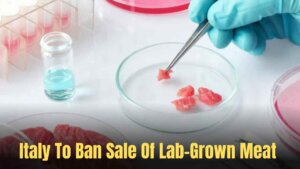The Italian government has recently approved a bill that would ban the production of laboratory-grown meat and other synthetic foods. The move is aimed at protecting Italian food heritage and ensuring health protection. However, this has dealt a significant blow to animal welfare groups who have been promoting lab-made meat as a solution to issues such as protecting the environment from carbon emissions and improving food safety. The proposed ban comes with heavy fines for violators of up to €60,000 i.e. ₹5,374,356.79 (INR), and if passed by parliament, Italian industry will not be allowed to produce food from cell cultures or tissues derived from vertebrate animals.
“Laboratory products, in our opinion, do not ensure quality, well-being, or the preservation of our culture and tradition,” said Cabinet member Francesco Lollobrigida, a senior member of Prime Minister Giorgia Meloni’s right-wing Brothers of Italy party.”

What is lab-grown meat?
Lab-grown meat, also known as cell-based meat, is produced from animal cells without slaughtering animals. Scientists extract cells from living animals and then grow and multiply them in a laboratory setting. The resulting product is a meat product that is essentially identical to meat from slaughtered animals.
Multinational Companies as Threats
Italian Food Industry to be Shielded from Harmful Technological Innovations
The Italian government, under the leadership of Prime Minister Giorgia Meloni, is taking steps to protect the country’s food industry by preventing the use of certain technological innovations that are deemed harmful. In order to do this, they have even changed the name of the agriculture ministry to the “ministry for agriculture and food sovereignty.” Coldiretti, Italy’s biggest farmers’ association, supports this move and believes that it is important to protect locally grown produce from competition with multinational corporations. Essentially, the Italian government is prioritizing the protection of their country’s food industry and its local farmers.
| Don’t Miss a Beat 👇 |
| Never miss a beat when it comes to food industry news! Join our WhatsApp group now. |
Animal Welfare Groups Reaction
The proposed ban on laboratory-produced meat and synthetic foods has received mixed reactions. While Italy’s farmers’ association supports the move to protect homegrown produce, some animal welfare groups see lab-made meat as a solution for issues like carbon emissions and food safety. The proposed bill follows the government’s recent decrees to ban flour derived from insects and require information labels on products made from insects. The government has cited Italy’s Mediterranean diet as motivation for both measures. However, the ban on lab-grown foods has angered organizations supporting “cell-based” agricultural products in Europe and animal rights groups.
Ban on Flour Derived from Insects
In addition to banning lab-grown meat and synthetic foods, the Italian government has also issued decrees to prohibit the use of flour derived from insects like crickets and locusts in pizza or pasta. They have also mandated that products containing or made from insects be labeled as such. These measures are motivated by the Italian government’s desire to protect the country’s prized Mediterranean diet. While some organizations support the ban on lab-grown foods, others who believe in the development of “cell-based” agricultural products and animal rights groups are against it.
Conclusion
The Italian government’s decision to ban laboratory-produced meat and synthetic foods has raised concerns among animal welfare groups and organizations advocating for cell-based agricultural products. The proposed ban would highlight the importance of Italy’s food heritage and health protection while shielding the Italian food industry from technological innovations deemed harmful. However, it remains to be seen whether the proposal will be passed by parliament and enforced in the future.
Don’t keep this news to yourself! Share this article on WhatsApp and LinkedIn to help others stay informed about the ban on lab-grown meat in Italy.